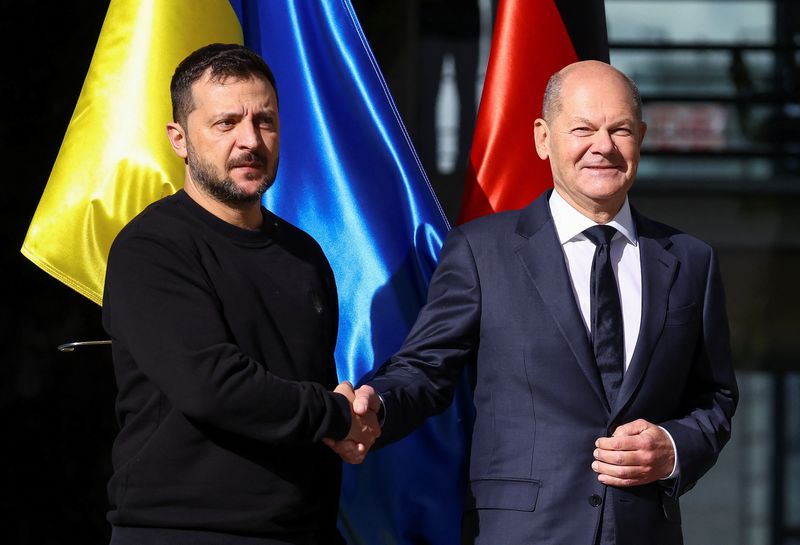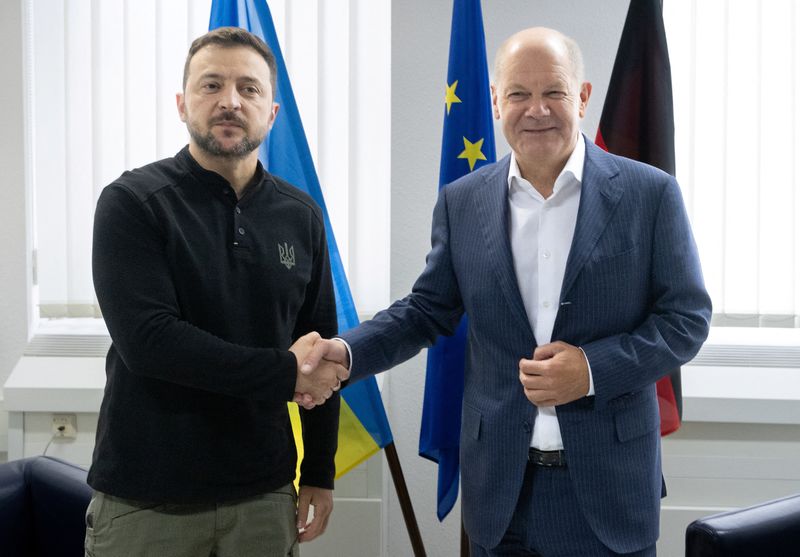By Andreas Rinke and Matthias Williams
BERLIN (Reuters) - German Chancellor Olaf Scholz on Friday announced a 1.4 billion euro ($1.53 billion) military aid package for Ukraine by the end of 2024, telling President Volodymyr Zelenskiy that it was a signal to Russia that the West would not stop supporting Kyiv.
The aid will be given jointly with partner countries Belgium, Denmark and Norway and includes more air defence, tanks, combat drones and artillery.
"It is a clear message to (Russian President Vladimir) Putin - playing for time will not work. We will not let up in our support for Ukraine," Scholz said.
Zelenskiy has been meeting allies in Europe this week to present a "victory plan" to end the war while also pressing to use long-range weapons that can strike deeper into Russian territory.
The details of his plan have not been divulged publicly. A U.S. official has previously described it as a repackaged request for more weapons and a lifting of restrictions on the use of long-range missiles.
A European diplomatic source also said that there appeared to be nothing especially new in the victory plan.
It centred around giving Ukraine quick access to NATO and a substantive increase in weapons supplies, including long-range missiles that could hit targets across the border so that Moscow would be more willing to enter peace talks.
"It is crucial for us that assistance does not decrease next year," Zelenskiy said alongside Scholz at the chancellery in Berlin. The two men are meeting for the fourth time this year, and Zelenskiy called it one of the most important meetings since the war began.
"Today I will present Olaf with a plan how, in our opinion, to force Russia to peace, that is, how to end this war – preferably no later than next year. And guarantee non-recurrence of aggression."
Zelenskiy's trip has been stymied by the cancellation of a major summit of allied leaders in Ramstein, Germany planned for this month after U.S. President Joe Biden postponed his visit to focus on Hurricane Milton.
Zelenskiy's trip comes at a critical time, with Kyiv trying to shift momentum on the battlefield ahead of the U.S. presidential elections in November and winter set to arrive under a barrage of strikes on Ukrainian energy infrastructure.
Germany is Ukraine's second-biggest donor of military aid but Scholz has balked at equipping Ukraine with long-range Taurus missiles and made no mention of them in his remarks.
Russia's invasion of Ukraine in 2022 triggered a defence spending overhaul in Germany.

But Berlin's support for Kyiv has also given oxygen to two Russia-friendly populist parties who performed strongly in recent regional elections and who have challenged mainstream parties ahead of federal elections next year.
($1 = 0.9151 euros)
